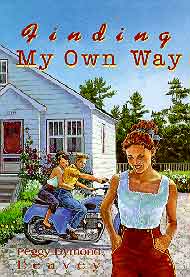| ________________
CM . . .
. Volume VIII Number 9 . . . . January 4, 2002
exerpt:
Seventeen-year-old Libby Eaton had lived all her life in Pinkney Corners until last fall when her mother died and she had to go and live with an aunt in Toronto. After spending the school year there, however, all she wants is to move back "home" to the Corners, to live again in her own house, reclaim her dog from the neighbours, get a job and do her own thing. Aunt Irene is persuaded only after much talk (and Libby's doing well enough at school to be exempted from her exams) and the summer stretches ahead, hers to experience and enjoy. Which she does. The events of the summer are not earth-shattering. She settles in, gets a job at the five-and-dime store, and avoids the unwanted attentions of the assistant manager. She then gets fired after writing an article for the local newspaper about being harassed. She finds she still has a crush on the brother of her best friend and discovers a bit of family history. She reestablishes a family connection with a Russian emigre, and develops an interest in history in general and Russian history in particular. Her house burns down. By the end of the summer, she has found where her talents and priorities lie, and she is ready to move ahead in life, rather than continuing in her attempt to turn the clock back. As a coming-of-age story this is satisfying. Libby is an interesting but basically unformed character at the beginning of the novel, and, by the end, she has achieved an ambition and firmness of purpose that is both believable and acceptable. It is interesting that, while Libby observed a man trying to take advantage of her mother when she was young and didn't understand what was going on, she, herself, was the object of exactly the same sort of unsolicited attention, and behaved in a very similar manner. This is historical fiction of two times. Libby lives in the 1950s, she remembers the '40s and, at least for me, some of this is not history, but nostalgia! Inflation is given real meaning when Libby buys basic groceries for $8---and gets a job paying forty-three cents an hour! The seats on Toronto street-cars are stuffed with straw. The editor of the local newspaper is also its advertising agent, its copy writer and its proof reader. Male chauvinism may be disliked and resented, but it is accepted as the way things are. This is history? This is history! It's just recent history, and well worth reading about. Mary Thomas works in two elementary school libraries in Winnipeg, MB, and had her first summer jobs in the 1950s.
To comment on this
title or this review, send mail to cm@umanitoba.ca.
Copyright © the Manitoba Library Association. Reproduction for personal
use is permitted only if this copyright notice is maintained. Any other
reproduction is prohibited without permission.
Published by
NEXT REVIEW |TABLE OF CONTENTS FOR THIS ISSUE - January 4, 2002.
AUTHORS
| TITLES | MEDIA REVIEWS
| PROFILES
| BACK ISSUES
| SEARCH | CMARCHIVE
| HOME
|
